
Sept. 15, 2021
Publications

 ► Full Reference: M.-A. Frison-Roche, Ex Ante Responsibility, Working Paper, December 2021.
► Full Reference: M.-A. Frison-Roche, Ex Ante Responsibility, Working Paper, December 2021.
____
📝This Working Paper has been the basis for an article written in French, "La responsabilité Ex Ante", published in the Archives de Philosophie du droit (APD), in the book 📗La Responsabilité (2022).
____
► Working Paper Summary: Quel est le temps auquel s'articule la responsabilité ? La question est si classique que toutes les réponses ont été dessinées : si l'on est responsable plus aisément par rapport au temps, car l'on peut alors plus aisément faire un lien entre la situation appréhendée, sa réalisation dans le passé la rendant plus facilement connaissable, et le poids de "responsabilité" que l'on impute sur une personne, l'on peut articuler la responsabilité avec le futur. Si l'on brise le poids de cette responsabilité avec un évènement ou une situation, par exemple. Le Principe Responsabilité de Jonas ou l'Ethique de la Responsabilité font ainsi voyager la Responsabilité dans le temps, par un rapport entre le Droit et l'Ethique.
D'ailleurs l'on pourrait soutenir que le Droit peut faire ce qu'il veut et imputer une responsabilité à quiconque pour le temps qu'il désigne, par exemple désigne comme porteur d'une responsabilité, c'est-à-dire d'un poids, celui qu'il veut. Le "responsable" serait alors le titulaire d'une sorte de "poids pur", qui le charge parce que le Droit l'a voulu pour le temps qu'il veut, par exemple un devoir d'agir pour que le futur soit dessiné comme le veut le Droit, alors même que le Responsable n'a rien à se reprocher dans le passé.
Mais les Cours constitutionnelle défendent un rapport minimal entre la Responsabilité et le poids que celle-ci fait porter une personne, fut-t-elle morale, gardant ainsi le lien consubstantiel entre le Droit et la Morale, la technique juridique de la Responsabilité ne pouvant équivaloir à celle d'un prélèvement obligatoire.
Ainsi l'idée d'une Responsabilité Ex Ante est simple dans son principe (I). Elle est celle d'un poids juridiquement posé sur une personne soit par elle-même (engagement), soit par la Loi ou par le Juge sur une personne de faire quelque chose pour que n'advienne pas quelque chose qui adviendrait ou pour qu'advienne quelque chose qui n'adviendrait pas si elle ne le faisait pas.
Mais les conditions juridiques pour admettre un tel poids alors même que le lien avec une situation passée serait brisé est plus difficile (II). On continue certes continuer à voir dans le futur le passé, ce qui facilite le voyage dans le temps, et fonda par exemple le contrôle Ex Ante du contrôle des concentrations. Mais l'on peut se briser même de cette facilité et regarder non plus le rapport entre le passé et le futur, mais le présent et le futur : ce que l'on sait déjà aujourd'hui du futur, ce qui met en jeu le rapport entre le Droit et la Science ; ce que l'on observe de l'emprise de la personne présente sur le moment présent, c'est-à-dire le Pouvoir, ce qui fait en jeu le rapport entre le Droit et l'Economie politique.
Dans cette dimension-là, la contrainte de la Responsabilité Ex Ante est alors maniée par le Juge, dont l'office lui-même devient un office Ex Ante. Les pouvoirs obligés Ex Ante par une telle responsabilité maniée par le Juge étaient les personnes en situation de pouvoir, sont non seulement les entreprises, mais encore les Etats, qui perdent le privilège - partagé avec les contractants - de disposer juridiquement du futur, et notamment en leur sein le Législateur.
Une telle révolution, qui se déroule sous nos yeux, s'explique parce qu'il faut agir maintenant pour que le futur ne soit pas catastrophique. La science nous informe qu'il le sera entéléchiquement. Il est donc juridiquement requis de désigner des responsables, non pas parce qu'ils auraient fait quelque chose, la dimension Ex Post n'étant pas le sujet, mais pour qu'ils fassent quelque chose, la Responsabilité Ex Ante étant un élément central de cette nouvelle branche du Droit qu'est le Droit de la Compliance.

Aug. 25, 2021
Publications


🌐follow Marie-Anne Frison-Roche on LinkedIn
🌐subscribe to the Newsletter MAFR Regulation, Compliance, Law
____
► Full Reference: M.-A. Frison-Roche, M.-A., Monumental Goals, beating heart of Compliance Law, Working Paper, August 2021
____
📝This Working Paper is the basis for the article, "Les buts monumentaux, cœur battant du droit de la compliance", constituting the introduction ⤵
📕in its French version, of the book Les buts monumentaux de la Compliance, in the Series 📚Régulations & Compliance
📘in its English version, of the book, Compliance Monumental Goals, in the Series 📚Compliance & Regulation
____
► Summary of the Working Paper:
Compliance Law can be defined as the set of processes requiring companies to show that they comply with all the regulations that apply to them. It is also possible to define this branch of Law by a normative heart: the "Monumental Goals". These explain the technical new legal solutions, thus made them clearer, accessible and anticipable. This definition is also based on a bet, that of caring for others that human beings can have in common, a universality.
Through the Monumental Goals, appears a definition of Compliance Law that is new, original, and specific. This new term "Compliance", even in non-English vocabulary, in fact designates a new ambition: that a systemic catastrophe shall not be repeated in the future. This Monumental Goal was designed by History, which gives it a different dimension in the United States and in Europe. But the heart is common in the West, because it is always about detecting and preventing what could produce a future systemic catastrophe, which falls under "negative monumental goals", even to act so that the future is positively different ("positive monumental goals"), the whole being articulated in the notion of "concern for others", the Monumental Goals thus unifying Compliance Law.
In this, they reveal and reinforce the always systemic nature of Compliance Law, as management of systemic risks and extension of Regulation Law, outside of any sector, which makes solutions available for non-sector spaces, in particular digital space. Because wanting to prevent the future (preventing evil from happening; making good happen) is by nature political, Compliance Law by nature concretizes ambitions of a political nature, in particular in its positive monumental goals, notably effective equality between human beings, including geographically distant or future human beings.
The practical consequences of this definition of Compliance Law by Monumental Goals are immense. A contrario, this makes it possible to avoid the excesses of a "conformity law" aimed at the effectiveness of all applicable regulations, a very dangerous perspective. This makes it possible to select effective Compliance Tools with regard to these goals, to grasp the spirit of the material without being locked into its flow of letters. This leads to not dissociating the power required of companies and the permanent supervision that the public authorities must exercise over them.
We can therefore expect a lot from such a definition of Compliance Law by its Monumental Goals. It engenders an alliance between the Political Power, legitimate to enact the Monumental Goals, and the crucial operators, in a position to concretize them and appointed because they are able to do so. It makes it possible to find global legal solutions for global systemic difficulties that are a priori insurmountable, particularly in climate matters and for the effective protection of people in the now digital world in which we live. It expresses values that can unite human beings.
In this, Compliance Law built on Monumental Goals is also a bet. Even if the requirement of "conformity" is articulated with this present conception of what Compliance Law is, this conception based on Monumental Law is based on the human ability to be free, while conformity law supposes more the human ability to obey.
Therefore Compliance Law, defined by the Monumental Goals, is essential for our future, while conformity law is not.
________
Read the developments below⤵️

Aug. 16, 2021
Publications

 ► Full Reference: Frison-Roche, M.-A, Reinforce the judge and the lawyer to impose Compliance Law as a characteristic of the Rule of Law, Working Paper, August 2021.
► Full Reference: Frison-Roche, M.-A, Reinforce the judge and the lawyer to impose Compliance Law as a characteristic of the Rule of Law, Working Paper, August 2021.
____
🎤 this working document has been made to prepare some elements of the opening intervention in the symposium Quels juges pour la Compliance) ? (Which judges for Compliance?), co-organized by the Journal of Regulation & Compliance and the Institut Droit Dauphine, held at the Paris Dauphine University on September 23, 2021, constituting the first part of the intervention.
____
📝it has been also the basis for an article:
📕 published in its French version in the book La juridictionnalisation de la Compliance, in the collection📚Régulations & Compliance
📘published in its English version in the book Compliance Jurisdictionalisation, in the collection 📚Compliance & Regulation
____
► Summary of the Working Paper: One can understand that the compliance mechanisms are presented with hostility because they seem designed to keep the judge away, whereas there is no Rule of Law without a judge. Solid arguments present compliance techniques as converging towards the uselessness of the judge (I). Certainly, we come across magistrates, and of all kinds, and powerful ones, but that would be a sign of imperfection: its ex-ante logic has been deployed in all its effectiveness, the judge would no longer be required... And the lawyer would disappear so with him...
This perspective of a world without a judge, without a lawyer and ultimately without Law, where algorithms could organize through multiple processes in Ex Ante the obedience of everyone, the "conformity" of all our behaviors with all the regulatory mass that is applicable to us, supposes that this new branch of Law would be defined as the concentration of processes which gives full effectiveness to all the rules, regardless of their content. But supposing that this engineer's dream is even achievable, it is not possible in a democratic and free world to do without judges and lawyers.
Therefore, it is imperative to recognize their contributions to Compliance Law, related and invaluable contributions (II).
First of all, because a pure Ex Ante never existed and even in the time of the Chinese legists📎
Even more so, Compliance Law only takes its sense from its Monumental Goals📎
____
🔓read the Working Paper developments below⤵️
L’empire chinois n’a semble-t-il jamais apprécié les juges, ne leur faisant place que sous la forme de serviteurs purs de l’Etat, qu’ils soient des enquêteurs, des punisseurs et de gardiens de l’ordre public. Sur cet aspect du Droit chinois, v. … ; sur cette période particulièrement sanglante des légistes, où le principe de « certitude » de la législation a été portée à ses nues, v. …
🕴️Frison-Roche, M.-A. (ed.), 📘Compliance Monumental Goals, 2022.
The topic of this study is general. For a more analytical perspective, s.. 🕴️Frison-Roche, M.-A., « The function of the Judge in Compliance Law », in 🕴️Frison-Roche, M.A. (ed.), 📘Compliance Jurisdictionalisation, 2023.
🕴️Frison-Roche, M.-A. (ed.), 📘Compliance Tools, 2021.

Aug. 10, 2021
Publications

 Référence complète : Frison-Roche, M.-A., Le rôle du juge dans le Droit de la Compliance, document de travail, aout 2021.
Référence complète : Frison-Roche, M.-A., Le rôle du juge dans le Droit de la Compliance, document de travail, aout 2021.
____
🎤 ce document de travail a été élaboré pour préparer quelques éléments de l'intervention d'ouverture dans le colloque Quels juges pour la Compliance? , se tenant à l'Université Paris-Dauphine le 23 septembre 2021 et pour constituer la base d'un 📝article :
📕 cet article sera publié dans sa version française dans l'ouvrage La juridictionnalisation de la Compliance, dans la collection 📚Régulations & Compliance
📘 dans sa version anglaise dans l'ouvrage Compliance Jurisdictionalisation, dans la collection 📚Compliance & Regulation

July 22, 2021
Publications

 ►Full reference: Frison-Roche, M.-A., Definition of Principe of Proportionality and definition of Compliance Law, Working Paper, July 2021.
►Full reference: Frison-Roche, M.-A., Definition of Principe of Proportionality and definition of Compliance Law, Working Paper, July 2021.
____
🎤 this Working Paper is the basis for a conference in the colloquium Compliance and Proportionality. From the control of Proportionality to the proportionality of the control, to be helded in Toulouse, France, on the 14th October 2021.
📝It constitutes the basis for an article:
📕 this article will be published in its French version in the book Les buts monumentaux de la Compliance, in the Series 
📘 in its English version in the book Compliance Monumental Goals, in the Series 
____
► Working Paper Summary: Measuring the relationship between the Principle of Proportionality and Compliance Law depends entirely on the Definition chosen for Compliance Law. Let us first take the definition of Compliance Law as a simple "mode of effectiveness" of the rules to which we hold (I). The more we stick to this procedural definition of Compliance Law as a mode of effectiveness of the rules, the less it is easy to detect specificities in the application of the Principle of proportionality in compliance mechanisms. There are certainly many examples of the application of the principle of proportionality, but the addition and variety of examples are not enough to sculpt an original relationship between Proportionality and Compliance.
However, this exercise is not wasted. In fact, in the confusion which still marks the emergence of Compliance Law, the legal nature of the compliance mechanisms remains contested. However, the imposition of Proportionality, not only as it is an obligation but as a limitation of powers in this first definition focusing on Efficiency, recalls that Compliance, conceived as " process ", would then in any case be admissible at the very least as a" Procedure ", anchored in the Rule of Law Principle, therefore self-limititation expression. But Proportionality is then like a cold shower in compliance, since it is defined by self-limitation in a Law which would be defined by effectiveness as its only definition... Ineffectiveness In Efficiency...: it is no longer a relation, it is then an opposition which is established between the two terms ...
In this definition of Compliance Law, there is no other choice than to put process in this sort of squaring circle because in this procedural Compliance Definition, as a method of effectiveness, of effectiveness and efficiency of the rules estimated more important more than others, it must however be admitted that Compliance Law, as any branch of the Law, without denying its very legal nature, must be anchored in the Rule of Law Principle.
By the principle of proportionality, this new branch of Law is forced to anchor classic solutions from Constitutional, Public or Criminal Law, the Principle of Proportionality prohibiting the Compliance of be just a process. The Repression Law has a large part in this conception and the Proportionality Principle reminds it of the part that Criminal Law still takes (with difficulty and for the moment ...) in the admission of ineffectiveness that the Law demands, particularly in the face of Compliance technologies.
In this first definition, the Proportionality Principle thus reminds Compliance, entirely held in the idea of Efficiency that it is a "Law" of Compliance" and anchored in the Rule of Law Principle, it must limit its Effectiveness . It is therefore a kind of "price" that these techniques pay, with regret ..., to the Rule of Law and in particular to the freedoms of human beings. There is a strong temptation not to want to pay this price. For example by affirming that there is a new technological world, which the new system, entirely in algorithms, will promote in a move away from the Law, rejected towards the Old World. Frequently proposed, or set up for instance in China. Others say that we must "do the balance". But when you balance Efficiency performance and Efficiency self-limitation, you know very well who will win ...
But why not look rather on the side of a Definition of Compliance Law where, on the contrary, the two concepts, instead of opposing each other, support each other!
Indeed, Compliance Law is then defined as an extension of Regulatory Law as a set of rules, institutions, principles, methods and decisions taking their meaning and normativity for specific Goals. . In this definition, which is both specific and substantial, these "Monumental Goals" are systemic and require that all means be mobilized for them to be achieved. Future and negative in nature (events that must not happen) but also future and positive in nature (events that must occur), Compliance Law does not apply to all the rules whose effectiveness required, but this specific type of "Monumental Goals", in an alliance between the political authorities in charge of the future of human groups and the entities in a position to mobilize its means. The method is then different. It is no longer a question of entrenching and the prospect of repression fades into the background.
A reversal occurs. Proportionality ceases to be what limits Efficiency to become what increases Efficiency. As soon as Goals have be precised, Proportionality is not the consequence of the limitation (as in the principle of "necessity" of Criminal Law, insofar as the latter is an exception), it is the consequence of the fact that any legal mechanism is a "Compliance Tool", which only has meaning in relation to a "Monumental Goal". It is therefore essential to set the "Goal Monumental Goals". As this is where the legal normativity of Compliance is housed, the control must first and foremost relate to that. Then all the Compliance Tools must adjust in a "proportionate way", that is to say effective to its goals: as much as it is necessary, not more than it is necessary. According to the principle of economy (which is also called the "principle of elegance" in mathematics).
In consequence, the rule contrary to the Principle of Proportionality is: the rule useless to achieve the goal. The unnecessary rule is the disproportionate rule: this is how the judicial review of excessive sanctions should be understood, not by the notion of "the limit" but not by the notion of "the unnecessary".
Everything then depends on the legal quality of the goal. De jure - and this would deserve to be a requirement at constitutional level, the goal must always be clear, understandable, non-contradictory, attainable.
This increases the office of the Judge. This renews the power of the Legislator in a conception which ceases to be discretionary.
But the Legislator retains the prerogative of determining the Monumental Goals, while the Judge controls the quality of the formulation that he makes of them, in order to be able to measure the proportionality of the means which are put in front by the State and the Companies, while Companies can rally to the Monumental Goals of the Politics by making an alliance with them, but certainly not instituting others in an autonomous way because they are not normative political entities, whereas they are free to determine the means necessary to achieve these goals, the Judge controlling the proportionality mechanism that makes this new system work.
The case law of the German Constitutional Court expresses this conception. It is fully consistent with what Compliance Law is in what is the one Monumental Goal containing all the systemic Monumental Goals: the protection of the human being.
_____________

June 26, 2021
Publications

► Full reference: Frison-Roche, M.-A., Notes taken for the summary report of the colloquium of Droit et Commerce, La concurrence dans tous ses états ("Competition in all its states"), June 26, 2021.
This text is the translation of the notes taken in French (this colloquium was in French.
____
Notes' Summary: The opinions around the "Competition in all its states" highlighted the choices available for what could be this branch of Law tomorrow: choice of a political nature between various possible definitions of Competition Law.
In method, the main thing is that this definition be clear. For this, this definition must be based on a principle and that the goal pursued by competition law is simple, so that in a second step, competition law can be easily articulated on the one hand with other branches of law. (by the care of the judge, in particular), on the other hand with "policies", such as "competition policy", then other policies (by the care of political authorities, especially European).
In essence, two conceptions of principle are opposed: either Competition Law will want to appropriate the goals of other branches, such as those of Regulatory and Compliance Law, or Competition Law will have the modesty to remain anchored in its definition as Market Law. This is the crossroads where we are.
____
► Method: Because of the richness and diversity of the comments made, in order to keep to the time limit, some passages have not been repeated orally.
Because it is a synthesis, the document is only based on what was said and does not include technical references, nor does it refer to personal work.
► Articulation of the notes taken while listening to the different interventions of the successive speakers:
During two days, listening to all the interventions on "Competition Law in all its states" has brought out the choices that are offered for what could be tomorrow this branch of law: they are choices of a political nature between various possible definitions of what should be Competition Law.
The most important thing is undoubtedly that this definition be clear; in order to be clear, it must be based on principle and the goal pursued by Competition Law must be simple, in order to be articulated with other branches of law (by the judge, in particular), and with "policies", such as "competition policy", and then other policies (by political authorities, in particular European ones).
The speakers proposed various, even opposing conceptions of what Competition Law should be, but all agreed on the fact that it has suffered many shocks and that, without a doubt, its recovery requires a common "culture" of Competition.
The evolution has attacked the very pillars of Competition Law in order to better reconstruct it by moving it from a mainly Ex Post perspective to a mainly Ex Ante perspective, by giving relevance to the objects themselves, notably to data, by taking into consideration human beings.
The evolution can take place by internalizing the perspectives of Regulation and Compliance in a Competition Law that becomes hypertrophied and political, which raises the question of the legitimacy of this "holistic" conception; it can also take place by a Competition Law that remains "self-centered" on its technical notions of market, price, etc., but articulates with the other branches of Law, economic or not. This is a political choice
It is in the hands not only of the States and the Parliaments, particularly with regard to the digital space, but also, and above all, in the hands of the supreme courts, a category to which the Court of Justice of the European Union belongs and to which everyone has constantly referred.
- Read the notes below in full

June 22, 2021
Publications

 Full Reference: Frison-Roche, M.-A., The Judge-Judge ; articulating words and things in the face of the challenging conflict of interest born by Compliance Law, Working Paper, June 22, 2022.
Full Reference: Frison-Roche, M.-A., The Judge-Judge ; articulating words and things in the face of the challenging conflict of interest born by Compliance Law, Working Paper, June 22, 2022.
____
🎤 This Working Paper had been made to prepare a conference (done in French).
This conference took place in the Academic Colloquium, L'entreprise instituée Procureur et Juge d'elle-même par le Droit de la Compliance, in Lyon, the 23rd June 2021.
____
📝this Working Paper is the basis of an article to be published
📕 in its French version in the book La juridictionnalisation de la Compliance, in the Series 
📘 in its English version in the book Compliance Juridictionnalisation, in the Series 
____
► Working Paper Summary: Puisque le thème de cette réflexion générale sur L'entreprise instituée Juge et Procureur d'elle-même par le Droit de la Compliance porte sur un ensemble d'autres réflexions soucieuses de l’ajustement des mots et des choses, la façon dont le rapport entre les uns et les autres évoluent, ce travail va porter sur la question de savoir si cette évolution est radicale ou pas, lorsqu'on parle de "juge".
Car, "juger" c'est un mot que le Droit a disputé à d'autres discipline
Le Droit repère qui juge et oblige ce si-puissant à la procédure. Mais il a aussi le pouvoir d'instituer juge et tous les personnages du procès. Il le fait d'ordinaire avec clarté en distinguant les uns des choses. C'est si important que ce conseil a valeur constitutionnelle. Ainsi, non seulement celui qui juge doit être nommé ainsi mais l'appareillage procédurale qui va avec le personnage et qui constitue à la façon une façon de faire et des droits fondamentaux, ne sont pas "concédés" par bonté ou dans un second temps : c'est un bloc. Si l'on ne voulait pas avoir à supporter les droits processuels, il ne fallait vouloir être juge. Certes on pu en conclure que la procédure serait donc devenue "substantielle" ; par cette élévation, il s'agit plutôt de dire que la procédure ne serait plus une "matière servante": c'est une sorte de déclaration d'amour pour la procédure, tant qu'on affirme qu'à l'acte de juger, d'enquêter ou de poursuivre, sont "naturellement" attachées les droits pour celui qui risque d'en être l'objet.
Le Droit de la Compliance, à la recherche d'alliés pour atteindre les Buts Monumentaux pour l'atteinte desquels il a été institué, va requérir, voire exiger d'entreprises privées qu'elle aillent elles-mêmes rechercher, c'est-à-dire enquêter, des faits susceptibles de lui être reprochés. Le Droit de la Compliance va aussi exiger qu'elles poursuivent les personnes ayant commis ces faits. Il va encore exiger qu'elles sanctionnent les faits que des personnes ont commis en son nom.
On le comprend bien du point de vue de l'efficacité Ex Ante. La confusion est souvent très efficace. Par exemple il est plus efficace que celui qui poursuit soit aussi celui qui instruise et qui juge, puisqu'il connait bien le dossier. D'ailleurs il est plus efficace qu'il prenne aussi les règles, ainsi il connait mieux que quiconque "l'esprit" des textes. Cela fut souvent souligné en Droit de la Régulation. Mais tout cela ne va pas de soi.
Pour deux raisons, l'une extérieur et l'autre intérieure.
La première raison, extérieure, tient que l'on ne pourrait pas "nommer" juge qui ne l'est pas. Cela serait trop facile, car il suffirait alors de désigner quiconque, voire de le faire soi-même pour s'approprier le régime qui va avec, pouvoir notamment d'obtenir qu'autrui obéisse alors même qu'il n'est pas subordonné ou qu'il transmette des informations, alors même qu'il serait concurrent : il faudrait alors rappeler seul le juge pourrait se nommer juge ! et dans ce temps nouveau, voilà que des entreprises seraient juges, procureurs, enquêteurs ! Les temps seraient donc si graves et en si grand désordre qu'il faudrait en revenir à cette tautologie là...
La seconde raison, interne à l'entreprise, tient à ce que l'entreprise enquête sur elle-même, se juge elle-même, se sanctionne elle-même. Or, la personne morale n'exprimant sa volonté qu'à travers soit ses organes, l'on souligne en pratique les difficultés pour un même être humain de formuler des griefs, en tant qu'il est le mandataire de la personne morale, à la personne physique qu'il est lui-même. Les deux intérêts des deux ne sont pas les mêmes, sont souvent opposés, et comment les secrets de l'un peuvent être tenus à l'égard de l'autre. C'est tout le mystère, voire l'artifice de la personnalité morale qui apparaît et l'on comprend mieux que le Droit de la Compliance ne veut plus utiliser cette notion étrange. Car toues les règles de procédure ne peuvent masquer que se poursuivre soi-même n'a pas plus de sens que de contracter avec soi-même. Ce conflit d'intérêts est impossible à résoudre car nommer un même individu x puis le nommer y, en déclarant ouverte la dispute entre eux n'a pas de sens.
Ce dualisme impossible à admettre dès l'instant qu'il s'agit de faire jouer ces fonctions à l'égard des mandataires sociaux peut retrouver vie en instituant des tiers de confiance qui vont porter les secrets et les oppositions. Par exemple par la désignation de deux avocats distincts par l'être humain mandataire et l'être humain dirigeant, chaque avocat pouvant avoir des secrets l'un pour l'autre et s'opposer l'un à l'autre. Ces espaces de reconstitution des oppositions si "naturelles" en procédure entre celui qui juge et celui qui est jugé peuvent aussi avoir prendre la forme technologique des plateformes : là où il n'y a plus personne, là où le process a remplacé la procédure, il n'y a plus non plus de jugement humain. L'on mesure ainsi que la crainte des conflits d'intérêts est si forte que l'on se résigne à dire que seule la machine serait "impartiale", dérisoire conception de l'impartialité contre laquelle il convient de lutter.
Cela permet alors d'aboutir à une dernière question : l'entreprise peut-elle prétendre exercer le pouvoir juridictionnel de poursuivre et de juger et d'enquêter sans même se prétendre ni procureur, ni juge d'instruction, ni tribunal ? L'avantage serait de pouvoir se soustraire au régime juridique que le Droit classique attache à ses mots-là, principalement les droits de la défense, les droits d'action et le principe de publicité de la justice. Quand Facebook dit "réagir" à la décision du 5 mai 2021 adoptée par ce qui ne serait qu'un Oversight Board pour décider pourtant "en conséquence" une suspension de 2 ans du compte de Donald Trump, l'art des qualifications semble être utilisé afin d'éviter toute contrainte de régime. Mais cet art de l'euphémisme est bien ancien. Ainsi les Etats, lorsqu'ils voulurent accroître la répression, présentèrent la transformation du système comme un adoucissement de celui-ci à travers la "dépénalisation" du Droit économique, transféré des tribunaux correctionnels aux AAI. L'efficacité en fût grandement accrue, puisque les garanties de la procédure pénales ont cessé de s'appliquer. Mais 20 ans plus tard, les mots retrouvèrent leur chemin vers les choses : sous le Droit pénal, dormait la "matière pénale", qui requière la même "impartialité". Un juge un jour l'affirma et tout fut changé. Attendons donc ce qu'en diront les Cours, puisqu'elles sont les maîtres des qualifications, comme le dit l'article 12 du Code de procédure civil, qu'écrivit Motulsky.
Archives de Philosophie du Droit, Le jugement, ...
Kant, etc.
La procédure est ainsi ce qui fonde le procès de Nuremberg, lui-même berceau de la Justice internationale, alors même que l'Ordre juridique international n'existe pas.
Confucius affirmait que la seule mais suffisante façon de rappeler l'ordre dans le Royaume est de nommer "mère" la mère et "fils" le fils.

May 15, 2021
Publications

 Full Reference: Frison-Roche, M.-A. Place and Role of Companies in the Creation and Effectiveness of Compliance Law in Crisis, Working Paper, May 2021.
Full Reference: Frison-Roche, M.-A. Place and Role of Companies in the Creation and Effectiveness of Compliance Law in Crisis, Working Paper, May 2021.
____
This Working Paper has been elaborated as basis for a conference in the colloquium of Mai 17, 2021 (done in French: Normes publiques et Compliance en temps de crise : les buts monumentaux à l'épreuve.
This video is made with English substitutes.
It is also the basis for an article in the book Compliance Monumental Goals, the English version of which is co-published by the Journal of Regulation & Compliance (JoRC) and Bruylant.
Summary: This article has a very topic: the place of private Companies, with regard to the chapter's issue: "the ordeal of a crisis". The crisis constitutes a "test", that is to say, it brings evidence. Let us take it as such.
Indeed, during the health crisis, it appears that Companies have helped the Public Authorities to resist the shock, to endure and to get out of the Crisis. They did so by force, but they also took initiatives in this direction. From this too, we must learn lessons for the next crisis that will come. It is possible that this has already started in the form of another global and systemic crisis: the environmental crisis. In view of what we have been able to observe and the evolution of the Law, of the standards adopted by the Authorities but also by the new case law, what can we expect from Companies in the face of this next Crisis, willingly and strength
Lire ci-dessous les développements.

March 21, 2021
Publications

♾️ suivre Marie-Anne Frison-Roche sur LinkedIn
♾️ s'abonner à la Newsletter MAFR Regulation, Compliance, Law
____
► Référence complète : M.-A. Frison-Roche, 4 cas pratiques pour éprouver le couple Sécurité juridique /Insécurité juridique face à une crise économique, document de travail, mars 2021.
____
🖥️ Ce document de travail a été élaboré pour servir de base à une conférence se tenant le 22 mars à la Cour de cassation sur le thème de l'Insécurité juridique en cas de situation exceptionnelle, notamment en cas de crie économique : voir la présentation de la conférence et sa vidéo.
Il a été fait plutôt que de renoncer à faire cette conférence. Ce qui aurait été le résultat d'un "effet domino".
Quasiment le sujet même de cette conférence.
En effet, il a été élaboré sur page blanche en remplacement d'un premier document de travail, élaboré en février 2021, et non encore fini lorsque l'incendie qui s'est déclenché dans la nuit du 9 au 10 mars 2021 dans les entrepôts d'OVH a fait disparaître de très nombreux sites. Soit temporairement, soit définitivement. Suivant que les sites et leur sauvegarde avaient été situés dans tel ou tel bâtiment.
La perspective d'une possible sauvegarde de la sauvegarde de ce présent fût évoquée et la possible restauration du site envisagée par OVH pour le 22 mars, le jour même du colloque.
La sauvegarde des sauvegardes n'étant pas acquise, le document de travail initial n'étant pas achevé, j'ai choisi de reprendre le sujet sous un autre angle.
Car s'il est vrai que pouvoir accéder à sa documentation et sa bibliothèque, lesquelles sont sur mon site, est une bonne assise pour produire quelque chose, réfléchir sans cela est une méthode, ici contrainte, qui est également recevable.
Il suffit de regarder autour de soi.
____
📝 lire l'article alimenté par ce document de travail : "Instaurer l'insécurité juridique comme principe, outil de prévention des crises systémiques catastrophiques totales", 2023.
____
🔓Lire les développements ci-dessous ⤵️

Feb. 25, 2021
Publications
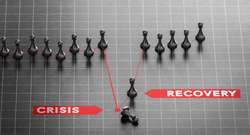
Référence complète : Frison-Roche, M.-A., La "crise économique", la concevoir et intégrer ouvertement de l'insécurité juridique. Comment la concevoir ? Quel régime juridique concevoir pour une insécurité juridique admise, voire requise ?
Ce document de travail a été élaboré pour servir de base à une intervention : L'avenir de la notion d'insécurité juridique au regard du traitement des situations extraordinaires : crise économique, dans le colloque "Insécurité juridique : émergence d'une notion ?, Cour de cassation, 22 mars 2021, Paris.
___________
"whatever it takes"
A un moment, le maître se lève. Si la position royale est la position assise lorsque, pondéré, il écoute et juge, c'est en se levant qu'il montre son acceptation d'être aussi le maître parce qu'il est en charge de plus et qu'il fera usage de tout pour gagner.
A situation financière exceptionnelle, tous les moyens de politique monétaire sont donc bons. C'est ce qui fût dit. Sans aucune limite. Et ce ne n'est pas un principe comme celui de la sécurité juridique, ayant permis à des personnes de jouer de leurs droits, par exemple celui de spéculer, d'engranger par avance des prérogatives sur la situation de demain, qui aurait pu empêcher cette puissance de jure permettant de sauver l'Europe. Car à prendre littéralement la formule, même si c'est au prix des droits acquis et des règles précédemment posées qu'il aurait valu payer, s'il avait valu faire page blanche pour en écrire de toutes nouvelles pour sauver l'Europe, la plume de Draghi les aurait tracées sans s'arrêter à cela. Ainsi, par une telle formule c'est par la Grande Porte, celle de la crise économique et financière, que l'insécurité juridique est entrée dans le Droit.
Dans le cas de la crise de 2008, la parole suffît puisque la perspective d'une intervention sans limite du pouvoir monétaire sans limite de la Banque centrale fit que les agissements spéculatifs dévastateurs ne déferlèrent pas. Avoir levé la règle de Droit en ce qu'elle suppose la limite en affirmant qu'il y aurait prévalence absolue du but, suffît donc en Ex Ante pour que la crise ultime ne s'ouvre pas. Cet épisode, digne d'Homère, suffit à éclairer l'insécurité juridique par une de ses dimensions lorsqu'elle est non seulement admissible mais requise : elle peut constituer un acte héroïque.
Dans une telle perspective, plutôt que de laisser l'insécurité juridique dans l'ombre ce qui ne serait qu'une sorte d'imperfection (parce que l'insécurité juridique ne serait donc que l'imperfection de la sécurité juridique), par l'idée par le "légalisme" devrait avoir des limites, que "le Droit n'est pas tout" et qu'il faudrait savoir "fermer les yeux"..., il faudrait plutôt assumer de dire que certaines circonstances il faut dire haut et fort, c'est-à-dire le dire de jure , l'insécurité juridique est légitime, licite, conforme à la hiérarchie des normes juridiques.
En cela, dessiner le concept positif de l'insécurité juridique (ce qui ne peut que plaire aux hégéliens), accroît la sécurité juridique : ainsi cela permet d'associer aux hypothèses d'insécurité juridique un régime juridique plus clair. En effet, plutôt que de mettre sous le tapis le Droit, ce qui explique bien des tensions entre le Conseil constitutionnel et le Conseil d'Etat d'une part et le Législateur et le Gouvernement d'autre part concernant "l'Etat d'urgence", l'on pourrait disposer des conditions dans lesquelles l'insécurité juridique permet d'écarter ou de limiter des règles.
Il est posé comme hypothèse qu'à l'avenir une certaine doser d'insécurité juridique pourrait être ouvertement admise : cela serait donc juridiquement conçu, le Droit gagnant toujours avancer à visage découvert. Même si l'on apprécie la "flexibilité" du Droit, il est toujours dangereux en Droit d'affirmer appliquer des règles tout en ne les appliquant pas.
L'idée proposée est donc que dans des "situations extraordinaires", l'insécurité juridique serait une dimension, voire un principe admissible. Et développant ce premier point il est proposé que l'hypothèse d'une "crise économique" justifie une dimension, voire un principe d' "insécurité juridique".
Mais cette première affirmation est à éprouver. En effet, une crise économique, notion qu'il convient de définir, si elle doit avoir un effet si majeur de retournement, est-elle une "situation" si extraordinaire que cela ?
En outre, pour traiter cette situation extraordinaire que constitue une "crise économique", quelle dose d'insécurité juridique serait juridiquement admissible, voire pourrait être juridiquement revendiquée ? Voire pourrait-on concevoir un renversement de principe qui conduirait le Droit applicable à une crise économique sous l'égide de l'insécurité juridique ?
Dans un tel cas, la question qui se pose alors est de déterminer les conditions et les critères de la sortie de la crise économique, voire de déterminer les éléments de perspective d'une crise économique, qui pourrait justifier par avance l'admission d'injection d'insécurité juridique. Le Droit a avant tout maîtriser sur le temps futur.
Intervention du 27 juillet 2015.
Sur la mise en perspective de l'affirmation d'Emmanuel Macron par rapport à l'affirmation de Mario Draghi.
Pour une perspective plus simplement financière, qui s'exprime du coup par une autre formule : Whatever it cost, v. Bessa- Quéré, A., 27 février 2021.

Feb. 8, 2021
Publications

 ► Référence complète : Frison-Roche, M.-A., L'invention de la vigilance : un terme nouveau pour une Responsabilité en Ex Ante, Document de travail, février 2021.
► Référence complète : Frison-Roche, M.-A., L'invention de la vigilance : un terme nouveau pour une Responsabilité en Ex Ante, Document de travail, février 2021.
____
Ce document de travail sert de base à une conférence donnée à Oslo le 9 février 2021.
Pour aller plus loin, ➡️La Responsabilité Ex Ante, 2022
____
Lire ci-dessous le document de travail⤵️

Jan. 6, 2021
Publications

Référence complète : Frison-Roche, M.-A., Environnemental Compliance Law, as an Ex Ante Responsability, for an annexe in a French Report on the liability for the environmental Damages, for the European Commission, janvier 2021.
_____

Updated: Dec. 24, 2020 (Initial publication: July 15, 2020)
Publications

This Working Paper has been the basis for the first conference of the two conferences in the colloquium in Toulouse (France) under the scientific direction of Lucien Rapp, about Les incitations, outils de la Compliance ("Incitations, as Compliance Tools"), on December 12, 2019, the first one about The sanction as incitation and the second one about Incitations and Compliance Law (synthesis of this colloquium).
Then, it has been the basis for the article, to be published in the books Les outils de la Compliance and Compliance Tools in the Series Régulations & Compliance.
Read a general presentation of this book.
Summary and Introduction of this Working Paper: At first glance, Compliance and Incentives appear to be totally opposite. For two major reasons. In the first place, because the sanctions have a central place in the Law of Compliance and the incentives suppose an absence of constraint on the operators. Secondly, because the incentives are linked to self-regulation and that Compliance Law assumes a strong presence of public authorities. Taking the first reason, one should choose: either Compliance or Incentives! Either the effectiveness of one or the effectiveness of the others; either the techniques of one or the techniques of others; either the philosophy of one or the philosophy of the others. Resign oneself to the loss that such a necessary choice would involve. But to put the terms thus amounts to think poorly about the situations and reduce the fields of the solutions which they call for. If we take a rich definition of Compliance Law, it is possible on the contrary to articulate Compliance and Incentives. From this perspective, sanctions can no longer become what blocks the use of incentives but, on the contrary, what constitutes them. Even more, the coupling between Incentives and the requirements of Compliance Law must be strongly encouraged, as soon as the public authorities supervise in Ex Ante all the initiatives taken by the "crucial operators".
This working document deals with the first issue
An honest observer can only feel immediately uneasy. Indeed, he can only raise the definition of the sanction as a "constraint" triggered Ex Post, at the very heart of Compliance Law which is presented as a set of Ex Ante mechanisms. Based on this contradiction in terms, should we give up the association and think that it would be wrong against the spirit to think of the sanction as an incentive?
It is undoubtedly in this connection that one perceives most clearly the clash of two cultures, which do not communicate, while technically they apply to the same situations. Indeed, because Compliance was firstly designed by Finance, everything is a tool for it. Therefore, the tendancy to think about the sanction only as an incentive is very strong in Compliance Law. It manifests itself continuously and will not stop (I). But whatever the reasons are to conceive it this way, the principles of the Rule of Law cannot disappear and if we do not want them to be erased, then they must be articulated (II). It’s an essential adjustment.
This is why we can literally say that Compliance has set Criminal Law on fire by its conception, logical but closed in on itself, of sanctions as simple incentives. For Law to remain, however, it is necessary to hold a very firm definition of Compliance Law centered on its Monumental Goal, which is the protection of the person.
La seconde problématique est analysée in "Compliance et Incitation : un couple à propulser", 2020.

Updated: Dec. 21, 2020 (Initial publication: Dec. 11, 2019)
Publications

This working document serves as the basis for two conference given in the symposium made under the direction of Lucien Rapp, Les incitations, outils de la Compliance ("Incitations: Compliance Tools").
Référence : Frison-Roche, M.-A., Compliance et Incitations : un couple à propulser, in Faculté de droit de l'Université Toulouse-Capitole, et Journal of Regulation & Compliance (JoRC),Les incitations, outils de la Compliance, 12 décembre 2019, Toulouse.
This Working Paper has been the basis for two conferences in the colloquium in Toulouse (France) under the scientific direction of Lucien Rapp, about Les incitations, outils de la Compliance ("Incitations, as Compliance Tools"), on December 12, 2019, the first one about The sanction as incitation and the second one about Incitations and Compliance Law (synthesis of this colloquium). sur le thème de la sanction comme incitation, la seconde en synthèse de ce colloque sur
After it has been the basis for the article, to be published in the books Les outils de la Compliance and Compliance Tools in the Series Régulations & Compliance.
Read a general presentation of this book.
____
Summary of this Working Paper: Compliance and Incentives appear at first glance to be totally opposite. Not only because sanctions are at the heart of Compliance and that sanction is associated with constraint while incentive is associated with non-constrained
To do this, the concept of “incentive Compliance” should be developed. This concept is not only appropriate, but it is necessary in a new conception of Sovereignty. For example for the digital Europe.
_________
Read the developments below.
Voir cette question analysée d’une façon autonome, Frison-Roche, M.A., Résoudre la contradiction entre « sanction » et « incitation » sous le feu du Droit de la Compliance, 2020.

Updated: Dec. 3, 2020 (Initial publication: July 15, 2020)
Publications
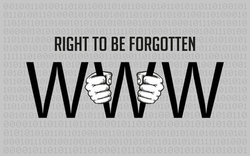
Full Reference : Frison-Roche, M.-A., Rights, primary and natural Compliance Tools, Working Paper, July 2020.
This Working paper is the basis for an article published in the collective book Compliance Tools .
____
There was a time when Regulatory techniques were above all only calculations of the best tarifications, taken up by monopolistic companies, while Compliance techniques were only obedience to all rules governing us. All this could therefore only be business of abacus and badine, used by engineers and consisted only of mechanical reflexes of "conformity" to all kinds of rules with the corset ensuring that everyone is bent in front of them
Systems have since evolved to integrate these prerogatives of each person: rights. Is this evolution really acquired? Maybe more effectively in Regulation Law than in its extension which is Compliance Law. This may be surprising since Compliance Law, in that it extends Regulatory Law in enterprises should, on the contrary, promote rights by meeting the enterprise, which is a group of people ....
In addition, if Regulation has long been the subject of a branch of Law in which rights have full place, the presentation of Compliance as "conformity", that is to say the proven assurance of obedience to all the applicable rules, leaves no space for the prerogatives of people, which appear rather as resistance to the obedience that would be expected of them. There again, the expectation of what would be a good ratio of conformity between behaviors and prescriptions would be obtained by a "design", data processing being the new form of calculation, improved by precision tools where the being human is not required
It would therefore be with regret, and probably because some constitutional jurisdictions still attach some value to fundamental rights that the systems of "conformity" of behavior to the rules make some room for the prerogatives of people, their more essential rights. It is sometimes said that this is part of the cost. It would therefore be as by "forcing" that rights would exist in Compliance systems, a kind of price that the effectiveness of Compliance must pay as a tribute to the Rule of Law principle
If in a poor definition Compliance is conceived in this only "conformity", leading to a landscape in which the behaviors of the people adjust to the rules governing the situations, Compliance being only the most "effective way" to ensure the application of the rules, in a mechanical perspective of Law, then it would effectively be necessary to reduce the prerogatives of people to a minimal part, because any "additional cost" is intended to disappear, even if it is produced here by constitutional requirements. In the looming battle between the effectiveness of the application of rules and the concern for the legal prerogatives of people who should above all obey and not claim their rights, especially their right not to obey , or their right to keep secret in Compliance techniques which is based on the centralization of information, the effectiveness of efficiency could only, by the very power of this tautology, prevail
The defeat would not be total, however, collaboration would still be possible and active between people availing themselves of their rights and Compliance Law. Indeed, in many respects, if rights have been recognized in Compliance systems, it is not only because Compliance Law, like any branch of Law, can only be deployed with respect for fundamental rights. kept by fundamental legal texts, but also because of the effectiveness of rights as " Compliance Tools".
Indeed, because they constitute a very effective "tool" to ensure the entire functioning of a system whose goals are so difficult to achieve, because every effort must be made to achieve these goals, the public authorities not only rely on the power of crucial operators, but also distribute prerogatives to people who, thus encouraged, activate the Compliance system and participate in the achievement of the "monumental goals". Rights can prove to be the most effective tools to effectively achieve the goals set, to such an extent that they can be considered as "primary tools" (I).
But it is necessary to be more ambitious, even to reverse the perspective. Indeed because all the Monumental Goals by which Compliance Law is defined can be reduced to the protection of people, that is to say to the effectiveness of their prerogatives, by a mirror effect between rights. given by Law to persons and the rights which constitute the very purpose of all Compliance Law, in particular the protection of all human beings, even if they are in a situation of great weakness, rights become a "natural tool" of Compliance Law (II).
Rights are the Compliance Law future.
Contre cela, la critique radicale, savante et fondée d'Alain Supiot, dans l'ensemble de son oeuvre et plus particulièrement dans La gouvernance par les nombres, 2015.
Sur la définition de l'entreprise comme un groupe de personnes qui se réunissent pour entreprise, v. le travail de référence d'Alain Supiot, par exemple son article d'introduction "L'entreprise...", dans l'ouvrage qu'il a dirigé L'entreprise dans la mondialisation ...., 2015 ...
Si l'entreprise pouvait renaître comme idée de cristallisation d'une idée commune entre des personnes, naturellement titulaires de droits subjectifs, exerçant ensemble leur liberté d'entreprendre pour réaliser un projet commun, ce qui correspond à la définition classique du contrat d'entreprise donnée à l'article 1832 du Code civil, cela renforcerait considérablement la présence des droits subjectifs dans le Droit de la Compliance et conforterait la nature humaniste de celui-ci.
En outre, dans une telle définition la loi de la majorité, qui n'est qu'une loi de fonctionnement d'une catégorie de sociétés que sont les sociétés de capitaux, deviendrait moins puissante, au profit des "droits propres" de tout associé (au-delà du cercle des sociétés de personnes), sans qu'il soit besoin d'aller chercher au-delà du cercle des associés ou titulaires de titres émis par la société ou l'entreprise (dit shareholders) et d'aller donner le "droit à la parole" à des personnes qui, parce qu'elles sont "concernées" (les "parties prenantes", les skateholders) ont désormais de plus en plus le "droit à la parole".
La Compliance by Design reflète ces tensions. Elles sont particulièrement bien décrites par Cécile Granier. V. ....
Contre cette conception de la légalité, qui prévoit tout et à laquelle il faudrait prouver par avance et que l'on se "conforme" entièrement, ce qui est contraire aux principes mêmes du libéralisme dont le principe est la liberté d'agir et non pas l'obéissance, Carbonnier affirme que les règles sont faites ne pas s'appliquer et qu'elles ne sont que le "mince vernis" des choses, qu'il convenait de se méfier de la "passion du Droit". V. not. son dernier ouvrage Droit et passion du droit sous la Vième République, 1995. Carbonnier est considéré comme le plus grand juriste français du XXième siècle. Il rédigea les lois qui réformèrent en profondeur le Code civil et publia des ouvrages sur "l'art législatif".
Au contraire, l'Etat de Droit n'est pas un coût extérieur au système de Compliance efficace, que celui-ci doit internaliser. Il est le fondement même du Droit de la Compliance. Voir dans ce sens la démonstration faite par le président de la Cour de Justice de l'Union européenne, Koen Laearnt, ..., in Pour une Europe de la Compliance, 2019.
Sur la démonstration comme quoi la Constitution, en ce qu'elle contient de l'incalculable, est broyée dans cette façon de faire, v. Alain Supiot, Intervention 2019.

Updated: Nov. 13, 2020 (Initial publication: July 15, 2020)
Publications

Référence : Frison-Roche, M.-A., Building by Law the unity of Compliance Tools from the definition of Compliance Law by its "Monumental Goals"", Working Paper 2020.
This Working Paper has been the basis for an article in the collective book Compliance Tools, 2020
___
Working Paper summary: The "tools of Compliance" do not stack on top of each other. They form a system, thanks to a unity drawn from the goals that all these multiple and different tools serve: the "Monumental Goals" by which Compliance Law is defined.
All these tools are configured by these goals and in order to master all these techniques, it is essential to put them all in perspective of what Compliance Law is, which is designed teleologically with regard to its goals. Extension of Regulatory Law and as, Compliance Law is built on a balance between the principle of competition and other concerns that public authorities claim to take care of. Compliance Law has moreover more "pretensions" in this respect, for example in environmental matters. All the means are then good, the violence of the tools marrying without difficulty with the voluntary commitments since it is the goals which govern this branch of Law.
As adopted legal solutions show, a common method of interpretation and common levels of constraint for all Compliance Tools result from this definition. Starting from the goals (in which legal normativity is housed), the interpretation of the different tools is thus unified, without the necessity of a legislation including all these Compliance tools. Moreover, the different degrees of constraint do not operate according to the consideration of sources (traditional legal criterion) but by the goals, according to the legal distinction between obligations of means and obligations of results which result from the articulation between tools, of which the establishment is an obligation of result, and the goals, of which the achievement is only an obligation of means.

Nov. 6, 2020
Publications
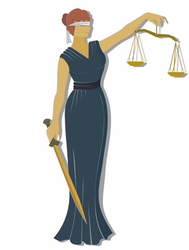
► Référence complète : M.-A. Frison-Roche, L'attractivité économique de l'impartialité juridictionnelle, document de travail, nov. 2020
____
🎥 Dans un premier temps, ce document de travail a servi de base à une intervention dans la conférence-débat présidée par le président François Ancel avec Madame la Conseillère Carole Champalaune, "L'office du juge, les enjeux économiques et l'impartialité", dans le cycle de Table-Ronde que la Cour de cassation organise sur le thème général de Penser l'office du juge.
____
📝 Dans un second temps et postérieurement à cette conférence, il avait vocation à servir de base à un article publié dans un ouvrage collectif. Il semble que ce projet n'ait pas abouti.
____
Présentation générale. Pour s'insérer dans l'ambition du cycle général de colloques qui est de "Penser l'Office du Juge" et dans celui-ci qui appréhende l'impératif d'attractivité économique de celui-ci, le propos dégage tout d'abord le rapport qui paraît contradictoire entre celui-ci et la distance que le juge doit conserver. Ainsi il est souvent affirmé que le juge devrait être à ce point internalisé dans les "places", notion économique de grande portée (à laquelle est consacrée la première partie de l'introduction, définissant la "place" à la fois comme un espace close et poreux et comme un "justiciable systémique") qu'il devrait ipso facto perdre sa distance, c'est-à-dire son impartialité. Comme les places sont en concurrence, même si l'on met en balance l'efficacité de la place, d'une part, et l'impartialité, d'une part, d'un juge qui lui est extérieur et se réfère au Droit, l'Impartialité en ressortirait nécessairement affaiblie. Il faudrait alors au cas par cas amener le juge à faire les concessions voulues.
Le propos vise à prendre la position contraire et poser que les places - notamment parce qu'il faut les distinguer fortement des marchés, dont elles furent les ancêtres - requièrent un juge, qui sont à la fois "singulier", c'est-à-dire avec une personnalité, un visage, des opinions, et en distance pour que sa fantaisie ne surprenne pas les places. En effet, celles-ci requièrent une justice humaine, et non pas mécanique et le juge singulier, dont le juge des référés ou l'arbitre sont l'épigone, répond à ce besoin. Mais pour réduire ces "marges de discrétion", façon dont l'économie qualifie l'impartialité d'une personne qui ne peut jamais être neutre, la façon de faire de ce juge doit être insérée dans des mécanismes qui diminuent ces marges. De cette façon, la place a alors un juge qui est toujours plus impartial, et ce faisant devient toujours plus attractive.
Pour obtenir cela en pratique, la place exprime deux attentes légitimes en tant que "justiciable systémique", dont la satisfaction accroit et l'impartialité du juge singulier et accroit l'attractivité de la place comme espace. Ce qui montre bien qu'attractivité de la place et impartialité du juge, parce qu'inséré dans des procédures et dans une institution et une famille juridictionnelle, ne sont non seulement pas contradictoires, mais sont au contraire convergents, l'un alimentant l'autre.
Concrètement, et la pratique juridictionnelle le montre, il faut consolider l’impartialité du juge singulier en l’insérant dans des processus collectifs. Comme il faut favoriser un rayonnement de l’impartialité par un renforcement de la « famille juridictionnelle ».
Pour consolider l'impartialité du juge singulier en l'insérant dans des processus collectif, il faut admettre sans hésiter la subjectivité du juge, la rechercher même, le juge des référés ou l'arbitre étant bien les épigones du juge adéquat. La réduction des marges de discrétion, définition de l'impartialité étant obtenue par l'insertion du juge dans une procédure dont il est seul le maître mais dans laquelle il n'est pas seul. Cela a pour conséquence technique qu'il est lui-même dans un débat contradictoire, non seulement pendant l'instance, mais encore avant celle-ci (dans les médias), par le jugement (et l'arrêt de la Chambre criminelle du 25 novembre 2020 est un modèle du genre) et après le jugement. En cela le juge montre que par son office il est dans le futur, comme le montrera la justice climatique. En outre pour limiter ses marges de discrétion, le juge singulier doit s'insérer dans un principe rationnel de cohérence, vertical et horizontal. Vertical parce qu'il intègre ce qu'il est dit et la technique de "l'avis déterminant" est à encourager, le juge singulier ne devant s'y soustraire que s'il a de "fortes raisons" pour le faire et selon cette règle générale Comply or Explain (qui est le contraire même de l'obéissance aveugle). Horizontal parce que le juge soit se tenir à ce qu'il a dit, l'estoppel étant elle-aussi une règle de logique. Mais surtout l'institution doit dégager le plus possible des "doctrines", par tous les moyens, dont les rapports annuels sont un exemple.
Pour consolider l'impartialité du juge singulier en renforçant la "famille juridictionnelle", il convient d'en avoir une conception plus large, ce qui pourrait mener à des "lignes directrices" communes à des juridictions diverses, et plus forte, en intégrant ceux qui entourent le juge pour mener jusqu'au jugement. En cela la procédure devant la Cour de Justice de l'Union européenne, travail sur un dossier commun, est un modèle. Si cette communauté était plus forte encore, l'office du juge rendrait un plus grand service encore qu'il ne fait déjà dans l'espace numérique.
Ainsi, des juges toujours humains, toujours divers, toujours singuliers, qui écoutent, considèrent et ajustent à la situation, qui au sein d'une famille juridictionnelle s'insèrent dans une doctrine institutionnelle qui les dépassent et les portent mais qu'ils transforment s'il y a une forte raison, toujours dite, pour ce faire : voilà l'impartialité incarnée rend ant une place économique et financière attractive.
Introduction. Quand j'ai choisi de consacrer quelques années à élaborer une thèse sur Le principe du contradictoire, en procédure civile, pénale et administrative, l'on m'avait conseillé de prendre un sujet plus étroit et moins basique. Quand j'ai été agrégée, l'on m'a conseillé de "passer aux choses sérieuses", c'est-à-dire au droit des affaires, mais c'est par une chronique de Droit processuel financier que j'ai débuté. Car ce lien entre la façon dont les juges progressent dans la façon de comprendre le cas (procédure) et arrivent jusqu'au moment de décider (jugement) est si fort avec la vie économique, comme les fils de chaine et les fils de trame, qu'on aurait bien tort de dissocier. Pour ma part je ne peux dissocier la solution trouvée et la façon d'élaborer celle-ci. D'ailleurs si les juristes anglais sont si précieux en droit des affaires, c'est sans doute parce que le contentieux leur coule dans les veines, que les techniques probatoires leur sont enseignées avec soin, que pour eux le juge est toujours virtuellement présent, assis à la table des négociations contractuelles, simplement actualisé si vient le temps du contentieux. De la même façon que Carbonnier disait que l'Etat est en France présent dans l'élaboration de tout contrat. Pour ne prendre qu'un exemple récent, quand je regarde comme tous les badauds les rebondissements de la saga Facebook, je mesure la dépendance dans laquelle et la Commission Européenne et cette entreprise que l'on dit toute-puissance sont par rapport au Président du Tribunal de l'Union européenne qui appliqua dans son Ordonnance du 29 octobre 2020 le principe du due process , lequel est la forme processuelle du droit au respect des données personnelles, pour réorganiser tout le mécanisme d'obtention des courriels échangés à l'intérieur de cette entreprise.
Pourtant quand j'écoute les représentants des grandes entreprises, ils ne semblent guère apprécier le Droit, qu'ils appellent généralement "réglementation", et encore moins les juges, ce qu'ils font et comment ils le font, c'est-à-dire leur office, les deux étant liés si l'on pose que "le juge applique la réglementation". Pour en rester à la perception des entreprises et sans entrer dans le sujet lui-même du rapport entre l'office du juge face à la loi
Mais si cela était si vrai, les entreprises cesseraient de tant vanter le modèle anglais, qui est décrit comme une sorte d'idéal dans presque chaque article, alors qu'il est si onéreux, ou le système américain, qui est si complexe dans son articulation entre les niveaux étatiques et le niveau fédéral que tout juriste américain est avant tout un processualiste.
L'idée est alors différente. Il ne s'agit plus de reprocher à la justice son inadéquation mécanique mais plutôt le fait qu'elle ne s'ajusterait pas aux besoins (avec le coût - accepté - de cet ajustement) du monde économique. En effet, le Royaume-Uni et les Etats-Unis seraient certes des sociétés juridictionnelles mais dans lesquels le juge aurait l'attitude adéquate : s'effacer derrière la loi des parties afin de mieux la servir. Les entreprises reprochent alors aux juges français ou allemand de ne pas suivre, participant en cela à ce qui serait ce grave défaut de l'Etat qui substitue sa volonté à celle des parties.
A lire divers travaux, les entreprises voudraient que l'Etat et ses juridictions se mêlent le moins possible de ce que les parties ont décidé tout en leur fournissent leur puissance au titre de ce principe de "sécurité juridique" portée au plus haut. Cette neutralité du principe de "sécurité juridique" qui utilise la force du Droit en lui ôtant pourtant la parole, utilisant le Droit et le juge comme des porte-voix, pose que les parties intéressées, qui sont les plus à même de mesurer leurs besoins et de construire les mécanismes adéquats, fassent leur "petite loi", puisque c'est par cette expression-là que Carbonnier désignait le contrat.
Mais comme dans le monde concret, l'idéal de l'ajustement contractuel pur et parfait n'existait pas plus que n'existe la concurrence pure et parfaite, un agent doit intervenir d'une façon neutre pour servir la petite loi quand l'autorégulation ne fonctionne pas, par exemple lorsque l'ajustement des intérêts ne perdure plus dans le temps. Comme Robespierre voulait un juge "bouche de la Loi", il faudrait un juge dont l'office serait d'être la "bouche du Contrat". Le juge anglais se définit sans doute ainsi, associant étroitement Impartialité et non-immixtion dans le contrat. Un juge non intrusif, qui jamais ne décide mais toujours sert.
C'est bien cette grille de lecture que le professeur d'économie d'Harvard a utilisé pour élaborer le classement Doing Business, qui mesure l'attractivité du Droit et du Juge, c'est-à-dire son aptitude à permettre aux entreprises, grandes ou petites, de se développer. Guy Canivet dans l'ouvrage qu'il co-dirigea à ce propos
Pourtant, cela non plus ne doit pas être si vrai, et l'association entre Impartialité et non-immixtion dans la situation initiale soumise au juge ne doit pas être si exacte, quand on entend par ailleurs tant de compliments argumentés adressés au Conseil d'Etat dans son appréhension du contentieux économique, que la suggestion est faite par des entreprises de lui en transférer la totalité de la connaissance, par exemple en matière de régulation financière et bancaire. Il ne paraît pourtant pas un juge effacé.
Mais c'est peut-être à force de lire les travaux d'Analyse Economique du Droit qui sont construits sur cette conception-là, que l'on finit par les recopier et peut-être y adhérer, souhaiter un juge qui ne dise jamais non, un juge mécanique. D'ailleurs ce que l'on appelle l' "intelligence artificielle" promet cela. Dans une justice non-humaine, la machine assure que la décision est prise avec une automaticité qui garantit une absence de parti-pris. Qui n'a pas d'âme ne peut être corrompu, qui n'a pas de raison ne peut se tromper. Cette passion actuelle pour les algorithmes, reposant sur la confiance faite aux machines et la défiance faite aux êtres humains, qui demeure les juges, repose sur un idéal de justice infaillible. Mais là encore c'est une erreur que d'associer Impartialité et Infaillibilité
Cette neutralisation du juge par les machines est généralement approuvée par les travaux. Elle n'est pourtant que le dépend de la solution plus artisanale et sanctionnée pénale consistant à neutraliser le juge par la corruption ; c'est un système juridique bien attractif que celui dont on est directement propriétaire... Mais les études montrent l'inefficacité économique pour une place de la corruption. Même si l'on laisse de côté l'appréciation morale de la corruption, l'effet sur l'image, etc., même si l'on imagine des entreprises qui n'adhèrent pas à "L'amour des Loi" posée par Rousseau, qui ne distinguent pas entre leur intérêt et leurs obligations - ne suivant les obligations que si elles ont un intérêt à le faire, la volonté du juge ne jouant plus alors que dans le jeu des incitations, qui placent le Droit et le Juge, comme des éléments de l'environnement des entreprises, il a été montré que les entreprises ne souhaitent pas un système juridique corrompu. La Commission Européenne a notamment publié des rapports sur la contribution directe de l'Etat de Droit et de l'effectivité de juridictions impartiales sur le développement économique d'une zone.
L'on semble donc confronté à une double aporie, menant à ce qui serait une sorte de souhait de disparition : soit il faudrait que le juge soit absent (pour en finir avec ce qui a été décrit d'une façon critique comme la "société contentieuse"), soit il faudrait qu'il soit un serviteur docile et neutre de la loi du contrat.
Parce que cela n'est pas admissible, le choc en retour est très violent. En effet, face à ce qui serait la prétention, voire l'exigence, des entreprises face au Droit, aux Juridictions et aux juges pris les uns après les autres (le juge pénal étant peut-être le plus détesté de tous...), la réaction est celle d'une sorte de rejet en bloc de cette demande des entreprises d'un juge qui prend en considération les effets économiques de ses décisions !
L'on lit alors en symétrie des rapports qui affirment que le "Droit n'est pas une marchandise", que le juge n'est pas un distributeur automatique de ces nouveaux bonbons sucrés que seraient les jugements devant faire toujours plaisir, que la notion de "marché du Droit" qui déclenche tant d'écrits théoriques, doit être rejetée. Car le Droit étant une valeur, la valeur de justice, le juge ayant pour office de concrétiser dans les cas particuliers cette vertu-là, ces prémisses d'adéquation de son office à ce qu'en attendent les entreprises, serait en quelque sorte attentatoire à la "grandeur de la Justice", réduite à l'état d'étalage où l'on propose à l'encan les jugements frais du matin aux acheteurs de systèmes juridiques, foi de forum shopping.
Bataille rangée, dont nul ne peut sortir gagnant, car les jugements sont à la fois une prestation et une valeur, Guy Canivet ayant montré l'apport de l'impartialité du juge à l'économie du Droit
Les entreprises savent qu'elles ne peuvent pas anéantir, sous les formes précitées, le Droit et les juges. Mais elles ne veulent pas non plus en dépendre totalement. Elles demandent comme tout un chacun un "juge en distance", car c'est ainsi que l'on peut définir l'impartialité : un juge impartial n'est ni un juge passif ni un juge mécanisé ni un juge transparent par rapport à la situation qu'il appréhende, c'est un juge qui par méthode parvient à se placer "en distance" par rapport à lui-même et à la situation qu'il a pour office d'appréhender
Mais en quoi cette exigence est-elle particulière pour les entreprises, par rapport aux autres justiciables ?
Car elles n'ont pas plus de "droit à un tribunal impartial"
Dès lors une décision nouvelle n'a pas le même statut pour un justiciable et pour ce justiciable systémique que sont les places. Tous dépendent de la justice et de sa qualité, et il est exclu de dire que les entreprises, notamment les grandes, devraient avoir une justice de meilleure qualité, que le commun des mortels. Précisément, le critère n'est pas là. En effet un justiciable aura besoin d'un jugement une fois. Les jugements rendus par ailleurs, avant et après, par ce juge ne le concernent pas car il ne reviendra pas. pour un justiciable systémique, c'est davantage les jugements futurs qu'il prend en considération. Les entreprises doivent pouvoir anticiper ce que dira le juge demain.
Pour cela, le juge ne doit pas pouvoir juger comme il l'est. Cette mise en distance par rapport à son propre pouvoir permet à la place d'intégrer par avance les jugements futurs (bons ou mauvais, là n'est pas le sujet), puisque les places sont des espaces de calcul et de probabilité, notamment les places financières.
Ce qui est donc à exclure est le "pouvoir discrétionnaire". En effet, un pouvoir qui tient entièrement en son dépendance celui sur lequel sa décision va porter est qualifié en Droit de "pouvoir discrétionnaire". Le pouvoir discrétionnaire n'existe quasiment plus en Droit français et européen. Un pouvoir ne doit pas pouvoir "disposer comme il le veut" de ceux qui dépendent de lui, si légitime, si puissant et si indépendant soit-il par rapport à eux.
Comme l'on ne peut, et l'on ne doit, pas nier le pouvoir du juge (car si on le nie, il l'exerce alors de fait, mais sans contrôle et sans limite), la demande des entreprises vient du fait qu'elles vont venir et revenir devant le même juge, la même juridiction, le même ordre de juridiction, le même système juridictionnel. Ce qui est attractif pour elles, c'est de pouvoir penser sur le moment qu'elles seront traités de la même façon dans le moment suivant : cette permanence dans le temps, quel que soit l'être humain singulier qui juge, constitue la qualité d'impartialité du juge. En cela, l'impartialité du juge est l'inverse de l'amitié entre Montaigne et La Boétie, il n'y a aucun phénomène d'élection, sans qu'il y ait de crainte pour autant. L'impartialité du juge garantit à l'entreprise qui viendra demain devant le juge qu'elle ne sera pas surprise par la façon incohérente dont son cas sera jugé.
Cette impartialité objective singulière du juge est une qualité qui constitue un élément d'attractivité majeure pour les opérateurs économiques.
Theme which has given rise to a large number of works, particularly in comparative law. The article 12 of the Code de procédure civile expresses what is the judge's mission with regards to the situation.
Canivet, G., Frison-Roche, M.-A. et Klein, M., Mesurer l'efficacité l'efficacité économique du Droit, 2007.
The positive Law related to the "judge's mistake" is itself very instructive, because it is not possible to reproach to the judge a mistake, except if there is a procedure fault, that is precisely the criterium developed in this study for the definition of impartiality. About this question, see Frison-Roche, M.-A., L'erreur du juge, 2001.
Canivet, G., Economie de la Justice et procès équitable, 2001.
Frison-Roche, M.-A., L'impartialité du juge, 1999.
Frison-Roche, M.-A., Le droit à un tribunal impartial, 2012.

Nov. 1, 2020
Publications

This working paper served as a basis for an interview organized by Olivia Dufour in French in Actu-juridiques-Lextenso on 11st of January 2021.

Sept. 10, 2020
Publications

This working document is the basis of an article written in French and published in the Recueil Dalloz in the Chroniques MAFR Droit de la Compliance (see the English presentation of this Chronique).
Read the presentation in English ot the other chroniques published by the Recueil Dalloz in these series Chroniques MAFR Droit de la Compliance

Updated: July 25, 2020 (Initial publication: July 1, 2020)
Publications

This working document served as the basis for an article, contribution in the collective book Compliance Tools, 2020
___
Summary of this working paper:
Training is a specific Compliance tool and a dimension that each Compliance tool expresses.
Firstly, as a training it is a specific Compliance Tool, it is supervised by Regulators. It even becomes compulsory when it is contained in Compliance programs. Since the effectivity and the efficiency are legal requirements, what is therefore the margin of companies to design it and how can we measure its result?
Secondly, as each Compliance Tool contains, more and more, an educational dimension, we can take back each of them to detect this perspective. Thus, even sanctions and prescriptions, are lessons: lessons given, lessons to follow. The question is then to know who, in this so pedagogic Compliance Law, are the "instructors"?
___________________________________________________________________
Introduction:
Training is akin to these things - and very precious - that we do, or even dream of doing, but so poorly expressed from the moment we take them as an object of technical writing. Just do it.
It would be however unfortunate to publish a book on Compliance Tools without giving a particular place to training, the piece would miss in the puzzle.
So much money spent by companies, by fair or foul means, especially when Compliance programs imposed as sanctions contain heavy training obligations leading people to retain word for word everything that is forbidden to them, in order to always abstain from now on. Training is thus the sharp point of such Hard Law appearing under the steel of Criminal Law's sword in amphitheaters and e-learnings.
But also so much speeches about the necessity of a "Compliance culture" which should be instilled to firms, Compliance spousing with joy in an harmony with their "raison d'être" and the historical identity of this group of people which is the company itself through trainings which tell Compliance as a link, an outstretched hand toward those with whom managers want to renew a moral contract in an ethic for which they give the good example. It is not Prohibition anymore but Communication and Community that set the tone of a human dialogue with employees, stakeholders, administration and judges.
It is possible to assume that the former does not exclude the latter, that Training should target all of this, the learning of mandatory prescriptions to follow without discussion but also the adhesion to guidelines, and this because everyone has understood that they are funded.
Everything and its contrary, then. "Learning by heart" takes here its full sense: get everyone to remember mechanically in order for no one to misstep (with always more machines which massively teach us the regulatory corpus on our mobile screens) but also succeed in bringing our "heart" in Compliance, thanks to specific training methods (with always smaller groups, with always less public discussions in pleasant places). Everything and its contrary, then.
It would be imperative but also sufficient to cumulate. Doing everything. Those who propose training softwares as those who organize conferences, meetings and travels and are favorable to this addition of face-to-face and distancing methods, of mechanic and of human relations. Concretely, at the end companies observe that since the first does not replace the second, costs add up. But, in Compliance, costs constitute a grave default of it, training taking a large part of this default. Managers end up finding the addition too heavy, especially if they thought that training of people is one of the public school's mission and not one of private companies' purpose!footnote-1837.
Moreover, training to Compliance is not outside Compliance Law, which makes it specific!footnote-1838. Indeed, Compliance Law, corpus of Ex Ante mechanisms, targets to concretize "monumental goals"!footnote-1836. Set by public authorities, these monumental goals are internalized in companies in order for them to implement expected means in order for them to be reached in the future. These monumental goals can be negative (that corruption, money laundering, human rights violations, financial system crisis, etc. shall not occur), or positive (that ecological equilibrium shall be restored, that education shall be supplied, that healthcare shall be provided, etc.).
Compliance Law takes as criteria of effectivity for implemented mechanisms, their reality, but also their efficiency, that is their ability to make sure their goal is achieved.Training must achieve its goal. Thus, in Compliance, the purpose is not only the one of every training, that is transmitting a knowledge in order to making the student more learned!footnote-1839, but it is to contribute to the "monumental goal" of Compliance Law itself, which is a practical goal and not a scholar goal. For example, training about the applicable rules concerning corruption should have an effect to reduce corruption. And because corruption is itself a part of Compliance Law, in the same way the Regulation Authority can force to educate oneself or train others, the Supervision Authority should control not only the reality but also the effectivity and the efficiency of trainings.
However, the effectivity and the efficiency of Compliance training, because they are full part of Compliance Law, should be controlled by the Authority not only in their reality but also in their concrete ability to participate in the pursued goal. Thus, to keep the example of fight against corruption, training plays in it an essential role because the firm faces an alternative: either a mechanic solution consisting in setting literal interdictions, for example the interdiction to give up a value greater than a certain amount (according to the "anti-gift" rule) with the risk of getting around that every literal prescription offers, or a a solution by training consisting in explaining to everybody that it is wrong to corrupt but that it is acceptable to give samples. Training rather bets on spirit while the machine integrates the letter.
But this refers to the Regulation and Supervision Authority which will appreciate the company due diligences to reach the goals. One observes that, more and more, Authorities economize one step: rather than explain to the companies how educate people that work for them or with them, regulators educate directly. Is on this point remarkable the "guide" published in 2012, whose second edition of 2019 has been updated in 2020, jointly by the Department of Justice (DoJ) and the financial regulator (Securities &Exchanges Commission - SEC) to know everything about the Foreign Corruption Practices Act (FCPA). Through the explanations offered to everyone!footnote-1840 of the principles, the reminded definitions, the told cases, they are behaviors prescriptions which are formulated especially for foreign companies by the prosecutor authority and the American sanction authority, allied in this handbook which has such weight that we can consider that it is as valuable as a guideline, soft law creator of Law and rights.
In the concentration of all powers which is often reproached to the Regulator, there is also the magisterium of the teacher, the one who educates stakeholders. After having assumed, on the American model, that the regulator should be the "advocate" of the rules for companies, proving to them the interest that they have to respect them, it is logical that, in what some have called "Regulation, Act 2" this Regulator's pleading about the good news of Regulation for the firm justifying thus that this one integrates it in Ex Ante was prolonged in magistral lesson: the "regulator-institutor" explains to everybody how using rules for an always still in progress Law ("Better Regulation").
While training was before only peripheral, it is now at the heart. If it is so important, as every other "Compliance tool", it should take what we expect from it. The publications about training most often exhibit what it should be and a sorrowful spirit measures what sometimes appears as a huge gap between descriptions and realities sometimes reported.
Educating being without any doubt one of the most difficult actions, we should probably neither describe a paradise of maieutics nor write a hot paper against what already has the merit to exist, but list what we can expect from Training mechanisms when they apply to Compliance, because here, rather more than for the other tools, it is a mean obligation. Which content should have a training ? (I). Because Compliance Law targets training as one of the mean to reach "monumental goals" which constitutes the substantial heart of this branch of Law, the training dimension is not limited to stamped training, finding back this pedagogical dimension in almost all the other tools (II). In that, Training appears as the alpha and the omega of Compliance.

July 15, 2020
Publications
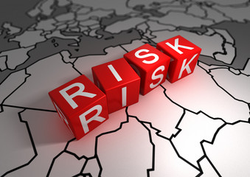
L'analyse des outils du Droit de la Compliance permet de mieux cerner ce qu'est le Droit de la Compliance dans son ensemble.
La "cartographie des risques" est analysée comme un outil essentiel de la Compliance, peut-être le plus important puisque ces cartographies sont des instruments élaborés en Ex Ante par les entreprises, ce qui correspond à la définition même du Droit de la Compliance, lequel est un Droit Ex Ante.
En cela, avant même de rechercher d'une façon plus analytique ce que peut constituer juridiquement l'activité pour une entreprise de dresser des cartes des risques qui l'entourent, pays par pays, activité par activité,
Le plus souvent l'on ne fait que décrire le mécanisme de cartographie des risques, sans le qualifier juridiquement. Le législateur ne fait pas davantage. Ainsi, dans l'article 17 de la loi dite "Sapin 2", la cartographie est décrite comme "la forme d'une documentation régulièrement actualisée et destinée à identifier, analyser et hiérarchiser les risques d'exposition de la société à des sollicitations externes aux fin de corruption, en fonction notamment des secteurs d’activité et des zones géographiques dans lesquels la société exerce son activité.". De la même façon, l'article 1ier de la loi dite "Vigilance" du 27 mars 2017 vise "une cartographie des risques destinées à leur identification, leur analyse et leur hiérarchisation".
Ce sont des descriptions, ce qui ne suffit pas à constituer une définition : le texte ne vise que la "forme" que cet élément d'information prend, sans en dire davantage. La lettre du texte descriptif inséré dans la seconde partie de l'article 17 de la Loi dite "Sapin 2, renvoyant à la première partie de cet article, le vise expressément comme une "modalité" d'une "l'obligation": cette "obligation" consiste à prendre des "mesures destinées à prévenir et à détecter la commission, en France ou à l'étranger, de faits de corruption ou de trafic d'influence". Pour bien remplir cette obligation, l'entreprise doit disposer de cet "outil" qu'est la cartographie des risques.
Si l'on sort du cas particulier de la lutte contre la corruption, la méthode est la même. Ainsi, de la même façon lorsqu'on consulte les documents par lesquels les Autorités de Régulation, par exemple l'Autorité de marché financier, présente la manière requise pour bien identifier les risques, y compris les risques de "non-conformité"!footnote-1734, l'on y trouve une description des façons de faire, mais sans davantage rencontrer de définition, encore moins de définition juridique de cette cartographie. L'on retrouve cette même tendance dans le procédé de la Compliance elle-même,
Peut-être que que cette absence de définition juridique de la Cartographie des risques n'est-elle elle-même que le reflet de l'absence plus générale du Droit dans dans l'ensemble des mécanismes de Compliance, absence paradoxale pour un espace si empli par ailleurs de la fureur pénale, sans doute parce que si souvent réduite dans sa présentation à un process mécanique, n'apparaissant juridique que sous son mauvais jour : celui de la sanction. Cette conception mécanique d'une Compliance comme process conduit à proposer que des machines et non des êtres humains en établissent les outils, notamment la cartographie des risques. Finis les compas et les cartes d'état-major, bonjour les bases de données et les connexions automatiques pour que des voyants d'alerte s'allument.
A lire les lois, il est acquis pour le législateur que la cartographie n'est qu'un "outil", la loi dite "Sapin 2" la désignant comme une "modalité". Prenant appui sur cette nature instrumentale, il faut donc chercher ce pour quoi est fait l'outil. Soit il est conçu pour que la loi ne soit pas méconnue, la cartographie repérant par exemple le risque accru que le Droit (souvent appelé la "réglementation") soit violé : c'est qu'il est usuellement désigné sous l'appellation étrange de "risque de conformité", terme que l'on trouve le plus souvent sous la plume de non-juristes et dont l'expression de "risque pénal" est sans doute l'ancêtre.
La cartographie permet alors à l'entreprise d'exécuter son "obligation de Compliance", c'est-à-dire de faire en sorte en Ex Ante que la loi soit respectée en éliminant par avance le risque qu'elle ne le soit pas. Ainsi dès 2008, l'OCDE définissait la cartographie des risques par ses objectifs, à savoir "mettre en place des moyens efficients pour réduire des risques de fraudes et de corruption et pour mettre en place des enquêtes efficients en concentrant les efforts sur les procédés efficaces". !footnote-1739.
Si la notion de corruption renvoie au Droit pénal, celle de fraudes est plus vaste que le Droit car si "la fraude corrompt tout" toute fraude n'est pas saisie par le Droit si la lutte pour la combattre n'emprunte pas un instrument juridique. Plus généralement et par ailleurs, de nombreux risques ne concernent en rien le Droit et devront pourtant être pris en considération par l'entreprise comme autant d'éléments d'information à considérer pour son action : les risques économiques, les risques naturels ou les risques politiques, ainsi que les "risques de marché", à propos desquels les Autorités de marchés, comme l'Autorité de marché financier dresse régulièrement une "cartographie des risques"!footnote-1740 . Mais cette cartographie-là ne semble pas regarder le Droit, alors même qu'elle ne relève déjà plus de la seule bonne gestion interne de l'entreprise.
Ainsi, si l'on choisit de consulte non plus les lois mais plutôt des cartographies élaborées par des entreprises, l'on doit constater leur diversité, sans savoir si ces cartographies constituent une "modalité" d'une obligation juridique, devenant de ce fait par transitivité un objet juridique, ou si elles constituent plutôt un élément de détermination de la stratégie de l'entreprise, appelant donc une qualification comme un "acte de management", ce qui est neutre pour le Droit.
L'on peut hésiter dans la réponse à apporter à la question, tout en soupçonnant l'existence d'une obligation générale de cartographier les risques, au-delà du cas particulier de la loi dite "Sapin 2" (dont le seul sujet est la corruption) car aujourd'hui de quoi le Droit ne se mêle-t-il pas ? Surtout d'un fait aussi important et prégnant et coûteux que la cartographie des risques, notamment dans des secteurs eux-mêmes "risqués" comme le secteur bancaire et financier, ou le secteur énergétique, ou (quittant la perspective sectorielle) dans l'espace digital ou dans le commerce international ?
Pourtant l'on observe à quel point la "cartographie des risques" n'a pour l'instant été que peu pensée en Droit. Il est vrai que le juriste, qui toujours ordonne, a du mal à suivre ... En effet, lorsqu'il est exposé que la cartographie doit viser à la fois des "risques économiques", des "risques politiques", et ces "risques de conformité" (c'est-à-dire de violation future du Droit), le juriste a du mal à comprendre comment les "risques de conformité" pourrait être un élément d'un outil qui n'est lui-même qu'un élément d'un "Droit de la Compliance", dont on lui affirme par ailleurs qu'il faut l'appeler "Droit de la Conformité" ? Même sans être expert de la théorie des ensembles, le juriste comprendre que cet élément de "conformité" ne peut pas être à la fois ce sous-ensemble et l'ensemble "conformité" dans lequel l'outil de la cartographie s'insère!footnote-1888.
L'on peut consulter de très nombreux écrits qui détaillent la cartographie, qui, par une sorte d'effet de miroirs, dressent des cartographies des exigences à laquelle l'entreprise doit se plier, pays par pays, textes par textes, secteurs par secteurs, loi par loi, aussi bien que des exigences de cartographies des risques de méconnaissance dans le futur de ces exigences ("risques de conformité").... Nous sommes face à un château de cartes, toujours plus minutieusement décrit, sans jamais rencontrer de qualification juridique.
Si l'on cherche pourtant une qualification juridique, ne serait-ce que pour produire de la sécurité juridique, l'on se demandera par exemple si l'acte de dresser une telle carte constitue un fait juridique ou un acte juridique. Je ne vois pas que la question ait été même posée. Pourtant, les conséquences de régime en sont immenses. En effet, à supposer que cela ne soit qu'un fait juridique, peut-il être un "fait justificatif" ? Les avocats y ont songé et ont plutôt trouvé du côté des Autorités publiques une porte fermée, lorsqu'ils ont voulu se prévalu des faits de diligences que constituent les cartographies de risques pour échapper à des sanctions...
Mais si dresser une cartographie n'était pas un simple fait mais pourquoi ne serait-ce pas un acte juridique ? La catégorie juridique des actes juridiques unilatéraux est là pour l'accueillir. Dans ce cas-là, la cartographie des risques engage l'entreprise et l'on observe que les autorités de régulation et de supervision, comme les juridictions, le conçoivent de plus en plus ainsi. Mais si l'entreprise est engagée par un tel acte juridique unilatéral que constitue la cartographie des risques, auprès de qui l'est-elle ? Plus précisément encore, si elle devient débitrice de l'obligation de cartographier, même si aucune loi particulière ne le lui prescrit d'une façon précise, alors il existe nécessairement un créancier bénéficiaire de cette obligation. Qui est-il ? Et pourquoi l'est-il ?
L'essentiel de cette contribution est de poser ces questions. Elles sont élémentaires. Elles ouvrent des pistes, celles que l'exercice de qualification juridique, de mise en catégorie juridique et de définition juridique, ouvrent.
Si pour l'instant l'exercice de qualification a été peu pratiqué, la cartographie des risques étant étrangement laissé aux algorithmes, aptes à entasser des données et inaptes à définir et à qualifier juridiquement, cela tient peut-être au fait plus général que le Droit et le risque sont peu souvent directement associés. Le mécanisme de bonne gestion que constitue la cartographie des risques, notamment dans les organisations qui ne sont pas des entreprises mais sont en charge d'administrer et adoptent sans contrainte cette bonne méthode!footnote-1735, y incite lui-même d'autant moins qu'on peut lire qu'il s'agirait, via ces cartographies, pour l'entité méticuleuse d'identifier par avance notamment le "risque juridique"!footnote-1731, c'est-à-dire l'application qui pourrait lui être fait du Droit, application incertaine, application contrariante. Combien de séminaires à succès sur le "risque pénal"... Comme en défense, les juristes exposent d'une façon trop générale que le Droit est constitué pour lutter contre le risque, lequel est un fait. En effet l'on répète à longueur de rapports que le système juridique est là pour "sécuriser", le réduisant parfois à cette performance technique tenant à sa nature même, par le principe de "sécurité juridique", que l'Etat par sa permanence, sa violence légitime, son imperium, nous donne en échange la paix, que le contrat par la "petite loi" qu'il constitue offre aux parties qui l'édictent un havre de sécurité pour cet îlot de stabilité dans un futur qu'on ne connait jamais tout à fait ; gare à nous si l'on sort de l'ordre juridique car l'on retombe dans le risque...
Ainsi, soit l'on est dans le Droit, assujettis aux exigences légales, et l'on bénéficie de sa sécurité spécifique, ce que les économistes désigneraient volontiers comme la "réglementation", soit on est dans la liberté de l'action, et l'on est alors dans le risque.... Il en serait comme pour les marchés, à propos desquels il faut choisir entre la liquidité et la sécurité : si l'on veut de la liberté d'action, alors il faut moins de réglementation, et donc moins de sécurité, plus de risque.... Cette opposition traditionnelle et si souvent relayée en économie est remise en cause par l'obligation de cartographie des risques car si ceux-ci sont établis, ce n'est pas pour les connaître en soi mais pour les combattre, au-delà de l'obligation classique d'information sur les risques, dont on trouve de nombreux ancrages dans les branches du Droit, notamment le Droit des sociétés, notamment celles exposés aux marchés financiers (I).
Dès lors, puisqu'il y a sous l'information classique de la prétention politique, de la volonté de "prévenir" le mal, qui se transforme rapidement dans la volonté de "promouvoir" le bien, le nouveau apparaît. La nouveauté est tout d'abord institutionnelle (II). En cela, la loi dite "Sapin 2", à travers l'instauration de l'Agence Française Anticorruption, a institutionnalisé ce mécanisme par lequel les entreprises "exposées" aux marchés financiers ou/et aux investisseurs internationaux, ou/et au commerce internationaux, présentent d'une façon claire et ordonnée -c'est-à-dire par une cartographie - les risques qu'ils ont identifiés dans leurs actions présentes et futures, rendant plus concrètement des comptes sur leur organisation structurelle d'analyse des risques. Des autorités publiques vont superviser les entreprises exposées à ces risques. Certes les banques y sont juridiquement accoutumées, mais les banques sont dans un secteur qui est régulé et supervisé. Ce qui est remarquable tient au fait que le Droit de la Compliance vient appliquer, via l'exigence de cartographie des risques, la technique juridique de supervision à des entreprises qui agissent dans des secteurs qui ne sont pas supervisés, voire qui ne sont parfois pas même régulés, par exemple l'immense champ du commerce international. De cette façon, ces entreprises, qui ne sont pas sectoriellement régulées, deviennent structurellement transparentes et supervisées au titre du Droit de la Compliance, qui contrôle notamment l'effectivité et l'efficacité du mécanisme de cartographie des risques.
Le principe libéral selon lequel une entreprise ne rend compte que de son comportement et non de son organisation interne en est entamé, puisque la cartographie des risques est un mécanisme Ex Ante qui relève de la structure même des entreprises et dont l'effectivité est contrôlée par les Autorités publiques. Ainsi, par la seule technique imposée par le Droit, la méthode de transparence, naguère propre aux entreprises supervisées devient générale à toutes les entreprises agissant sur des marchés ordinaires, dès l'instant qu'un risque existe. C'est une nouveauté radicale, puisque le risque dont il s'agit n'est pas un risque de secteur et qu'une crise générale n'est plus à craindre. La rupture est ainsi opérée avec le Droit de la supervision qui jusqu'ici était insécable du Droit de la Régulation, l'obligation de cartographie des risques s'appliquant à tout "opérateur crucial" exposé au risque de corruption, en ce que celle-ci doit être combattue d'une façon globale.
Dès lors, la cartographie des risque est un outil qui, au-delà de la simple description, prend sa définition d'une façon téléologique, comme est élaboré tout élément du Droit de la Compliance. Son but est de prévenir des risques qui compromettent des ambitions qui ne sont pas toujours de nature économique mais qui sont de nature politique (III). La lutte contre la corruption n'en est qu'un exemple, la loi dite "vigilance" exigeant elle-aussi une "cartographie des risques" en matière de droits humains, tandis que cette technique est reprise par des textes plus ou moins contraignant en matière environnementale. Certes des entreprises en position de porter de telles ambitions politiques, de force - en raison de leur position - ou de gré - par leur raison d'être ou par leur politique de responsabilité sociétale -, doivent le supporter, les transformant en acteurs politiques majeurs. Elles ne sauraient pour autant se substituer aux Autorités publiques, lesquelles d'une part fixent les "buts monumentaux" qu'il s'agit d'atteindre d'une part et qui d''autre part supervisent en Ex Ante et en Ex Post la mise en place et le fonctionnement de ces outils au sein des entreprises cruciales.

June 18, 2020
Publications

♾️follow Marie-Anne Frison-Roche on LinkedIn
♾️subscribe to the Newsletter MAFR Regulation, Compliance, Law
____
► Full Reference: M.-A. Frison-Roche, The dreamed Compliance Law, Working Paper, June 2020.
____
This Working Paper, "The Dreamed Compliance Law", is the basis for an article, written in French, "La compliance" (Compliance), inserted in the collective work to be published under the direction of Jean-Baptiste Racine, Le Droit économique du XXIème siècle (The XXIe century Economic Law , in the Serie Droit & Economie, LGDJ-Lextenso, 2020.
________
No one can know what the Law of the 21st century will be. Pretending to know it is just not to realize its ignorance. Why then writing about it, since the future is always surprising?
One can only write about the unknown part of the Law of tomorrow. If the future is then modeled on what was written, so much the better for the prophet, a tribute that can, for example, be paid to Pierre Godé
Lévi-Strauss argued that teaching is defined as dreaming out loud. Teaching and describing the Law of a century that we will never know gives even more freedom to dream about it. This freedom increases when the object is a branch of Law in the process of being born, state of the stammering "Compliance Law" of which some still maintain, as it was made for Regulation Law, that there is not existing. The hand can then, as it pleases, trace its beautiful or hideous features: what face will Compliance Law have, as soon as we assume that it will exist?
It may as well be a nightmare (I) as a happy dream (II).
It is up to us to choose in which category this branch of Law will flourish. Because what we can be sure of is this fulfillment. It is certainly already taking sides to presuppose the very existence of Compliance Law. Not only to consider it possibility with hostility because to be an enemy of something or someone is already to recognize their existence. Before that, two objections radically block the very existence of Compliance Law and their shadow remains in the future of it
Firstly, it is said that Compliance does not come under Law, but for example only ethics since it would consist in keeping well in companies which care about the interest of others or the planet, for example by spontaneous care of the environment; Compliance being a crystallization of social responsibility, the one for which we have our conscience, we express our "raison d'être" and we are not accountable
Second, there would be many Compliance mechanisms but insufficient to constitute a branch of Law. Indeed we would find Compliance in Company Law, Labor Law, Financial Law, Banking Law, Criminal Law, Administrative Law, European Law, International Law, etc.
These classic branches, which have been formed for so long, depending on the point of view adopted, would gain in modernity or be threatened with decay by this kind of extension which will be Compliance. There would thus be as many "little legal sectoral rules" as there are branches of law. These new internal developments would be like a new bud, on which care should be taken - if the tree regains its strength - or a weed to be eradicated - if the French garden loses its perspective.
Thus the matter being scattered as many as specialist lawyers, often criminalists or specialists in banking and Financial Law, then tomorrow all specialists in all branches of Law, this could constitute the most radical obstacle to the constitution of Compliance Law. Indeed, we would come back to confuse Compliance and the "modernization" of Law itself as a whole, since it would only be a question of perfecting each of the classic branches of the legal system.
If we keep in this half-sleep that is any projection in the future the hope of a constituted branch of Law, we must discard these two perspectives of annihilation, either in the total absence of Law or in recovery by all Law. To dismiss the sorrowful spirits who see no future in Compliance and keep only its enemies in the space of this article, let us assume that Compliance Law will exist in the 21st century. In what form and by what means, in the palm of which institutions, in the shadow of which legal system? Since it is a question of projecting ourselves onto the black screen of our nights of dreamy lawyers, let us take the current state only as a trailer. Like the one developed by the genius who by the contempt not only brought down into the flames of hell the cinema which has become a consumer industry with which producers force-feed us but offered us the vision of its future. What is what we see today the trailer? We let our imagination run wild since the trailer films are autonomous works compared to the film which follows them.
We have no idea what will happen and what we are watching from the brief and violent current images of Compliance Law, the cinema of which rather makes a hero of the whistleblower
Everything will depend on the concept that we will retain of Compliance Law. Because the script is not written, because Compliance Law is a Law with a political dimension, that it is defined by the ambitions that we can claim to have by setting monumental goals that we are going to achieve, a claim that will make it one major branch of the Law of tomorrow, or we can abandon any claim, lower our heads and arms, and reject any claim. It is then that the power of Compliance Law, which will be no less great, will turn against us, human beings, as in a nightmare.
Mélanges Pierre Godé, off-trade book, 2019.
Godé, P., Le Droit de l'avenir (Un Droit en devenir), 1999.
It is in particular the idea of the movement of analysis of Law & Literature which poses that by telling the past in one way or another, by thus inventing it, Law, and in particular the Judge, invents the future and being written, creates it. On this movement which was powerful in the United States, v. Cabrillac, R. et Frison-Roche, M.-A., Droit et Littérature, à paraître.
See infra I. Compliance Law as nightmarish octopus.
On the fact that "social responsibility" makes it possible not to be legally responsible, cf. Supiot, A., Du nouveau au self-service normatif: la responsabilité sociale des entreprises, 2004; this is not the subject of this article and this question will not be developed here.
See, for instance, ..., Replace Regulation by norm by Regulation by Data, 2020.
See, for instance, Frison-Roche, M.-A., Compliance Law (monography), 2016 ; Compliance Law, 2020.
On what the cinema does with the whistleblower, with the availability of trailers and extracts from the films, see Frison-Roche, M.-A., introduction of the article The impossible unicity of the legal category of whistleblowers, 2019.
Frison-Roche, M.-A., ... (retrouver sur LinkedIn).

April 24, 2020
Publications

Its subject is the confrontation between the current health crisis situation and the Compliance Law.
Summary. After defining Compliance Law, distinguishing the procedural and poor definition and the substantial and rich definition, the starting point is to admit the aporia: the type of health crisis caused by Covid-19 will be renewed and it is imperative to prevent it, even to manage it, then to organize the crisis exit. Public Authorities are legitimate to do so, but because this type of crisis being global and the State being consubstantially linked to borders, States are hardly powerful. Their traditional International Law shows their limits in this current crisis and one cannot hope that this configulration will improve radically.
In contrast, some companies and markets, notably the financial markets, are global. But the markets are not legitimate to carry out such missions and counting on the generosity of certain large companies is far too fragile in front of the "monumental goal" that is the prevention of the next health crisis, crisis which must never happen.
How to get out of this aporia?
By Compliance Law, basis of, in a literal and strong sense, the "Law of the Future".
We need to be inspired by the Banking and Financial Compliance Law. Designed in the United States after the 1929 crisis to tend towards the "monumental goal" of the absence of a new devastating crisis in the country and the world, this set of new legal mechanisms gave duty and power of supervision, regulation and compliance to market authorities and central bankers. These are independent of governments but in constant contact with them. Today, they claim to have as first priority the fight against climate change. Now and for the future, they must also be given the responsibility and the powers to prevent a global health disaster, similar to a global ecological disaster, similar to a global financial disaster. This does not require a modification of the texts because their mandate consists in fighting instability. Stability must become a primary legal principle, of which the fight against monetary instability was only a first example. By the new use that central banks must make of it by preventing and managing health crises, Compliance Law will ensure that the future will be not catastrophic.

March 22, 2020
Publications

This working paper is the basis for an article in the French Law Journal Le Clunet.
When we compare the terms "Compliance" and "Extraterritoriality", it is often with dissatisfaction, even anger and indignation. On the momentum, after having expressed a principle of disapproval of such a merger, attention is focused on how we can fight against it, to break the link between Compliance and Extraterritoriality. But do we have to go so fast? Is this negative initial assessment correct?
Indeed, thus gone, it is frequently explained that the binding mechanisms of Compliance are suffered, that they come from abroad!footnote-1750, that they apply with efficiency but in an illegitimate way, without agreement of the one who must submit to it, whose resistance is therefore certainly ineffective but nevertheless justified. In the same spirit, when we start to shell the cases, like so many scars, sort of rosary, even crown of thorns, BNPP case!footnote-1718, Astom case!footnote-1717, etc., the wounds not yet closed turn into reproaches made against the rules, public authorities, even reproaches made against named people.
We are leaving this kind of complaint against X, which targets what would be this appalling "Compliance", this Law which would be both hostile and mechanical which would not have been able to stay within the limits of borders, Compliance being thus placed in contrast to sovereignty and protection, which presuppose staying within its limits!footnote-1716 and being able to protect companies from abroad. More concretely, this presentation targets more directly the United States, which uses "the legal weapon", slipped under what is then designated as "the artifice of the Law" with extraterritorial scope. But this effect would in reality be the very object of the whole: their hegemonic will to better organize at least a global racket, notably through the Foreign Corrupt Practices Act (FCPA) and at best a world government through notably the embargoes.Those who believed otherwise would be naive or foolish. This silences the opponents because who likes this costume? So the world would be put in a ruled cut; what the mafia could not have done, Compliance Law would have obtained, offering the whole world to the United States thanks to the extraterritoriality of its national Law.
Compliance Law would thus become the very negation of Law, since it has the effect, even the purpose (barely concealed by strategic, powerful and shameless States), of counting borders for nothing, whereas Public International Law, in that it is built between the sovereign subjects of law that are the States presupposes the primary respect for borders to better exceed them while Private International Law takes the same postulate to better welcome foreign Law in situations presenting a foreign element!footnote-1726. Jurists believed in the force of Law; by Compliance, we would return to the sad reality that only the powerful, here the United States, dominate and - ironically - it is under the pretext of Law that they do it. It would be necessary to be well duped, or accomplice, to see there still legal where there is only the balance of powers. When one is more intelligent or skilful than that, one understands that the "small" can only be "subject" to the Compliance Law, one would have to be powerful to be the normative source and its enforcement agent. It is then towards this mis-named Department of Justice (DoJ) that the fearful, hateful and resigned glances turn.
If you see it that way, what should you do then? The answer is obvious: react!
It is necessary to save the sovereignty, France, companies, the Law itself. If that is how the question is posed, how can we disagree? It is therefore necessary to destroy the Compliance Law and the extra-territoriality of American Law which had found this "Trojan horse", an expression so frequently used. This is the basis for the administrative reports available, for example the Berger-Lellouche!footnote-1719 parliamentary reports and the Gauvainfootnote-1720 report. Both of them broadly develop the two preceding claims, namely that the extra-priority of compliance mechanisms is illegitimate and harmful, since it is a mechanism invented by the Americans and harming the Europeans, or even invented by the Americans to harm Europeans, the description being made in much more violent terms than those used here. The description seems acquired, the reflections therefore relate to the remedies. The reaction is most often to "block" the Compliance Law in its extraterritorial effect.
But without discussing the effectiveness of the remedies proposed downstream, it is necessary to return to this description so widely shared made upstream. Because many elements on the contrary lead to affirm that ComplianceLaw first of all and by nature can only be extraterritorial and that it must be. Whether or not the State in which it was created has malicious intentions. The description which is made to us most often describes particular cases from which we draw generalities, but we cannot reduce Compliance Law to the already cooled cases, as BNPP case, or to the always hot case of the American embargo on Iran. Furthermore, one cannot take the issue of embargoes and draw conclusions, legitimate for it, but which would apply to the whole of Compliance Law. The fact that theCompliance Law is a branch of Law at the stage still of emergence can lead to this confusion which consists in taking the part for the whole, but it is very regrettable because what is justified for the embargoes does not is in no way relevant for all Compliance Law, of which precisely the Law of embargoes is only a small part, even an abusive use. This overlapping is not often perceived, because the definition of Compliance Law and its criterion are not clearly enough defined, namely the existence of a "monumental goal"!footnote-1725, which does not exist in an embargo decided unilaterally by an order decreed by the President of the United States, but which exists in all other cases and fully justifies extraterritoriality, extraterritoriality which is even consubstantial with Compliance Law (I).
Once we have distinguished the embargoes, as an atypical, sometimes even illegitimate part, of Compliance Law, we should continue this work of distinction by emphasizing that the United States has certainly invented Compliance Law!footnote-1721 but only developed a mechanical concept for the prevention and management of systemic risks. Europe has taken up this systemic conception of the protection of systems, for example financial or banking, but superimposed another conception, drawing on its deep humanist tradition!footnote-1722, whose protection of personal data is only an example and whose monumental goal is the protection of the human being. This primary concern then justifies the European use of Compliance mechanisms to interfere with global objects regardless of their location, especially the environment, and to block the entry onto the ground of objects that enter, which is contrary to Competition Law but builds a legitimate barrier under this Compliance Law, in the indifference of an extraterritorial origin (II).
Indeed, this branch of the new Law which is Compliance Law is not reducible to Competition Law!footnote-1723, any more than it is not reducible to a method. It is a substantial, extraterritorial Law because the "monumental goals" which give it substantial unity are extraterritorial. This can directly contribute to the future of a Europe which on the one hand will be able to pursue, in an extraterritorial manner, monumental humanist goals, in the field of the environment or the protection of personal information or access to the Law (in particular by the technique of compliance programs) and which, on the other hand, by the techniques of traceability of products!footnote-1724, will have the means not to bring in products manufactured in an indecent manner, except in countries which do not grant value than in Competition Law to enter the WTO.
Read the developments below.

Jan. 17, 2020
Publications
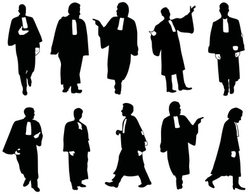
This Working Paper written in English is the basis for an article published in French in the French journal Dalloz Avocat , in March 2020.
Summary of the working Paper.
If we perceive Compliance Law as an aggression of the private company and a binding set of mechanisms that have no meaning and added value for it, then the attorney has a utility: defending the business. It can do so not only during the sanctions phase, but also to prevent it.
But this function is not central.
It becomes so if we understand Compliance Law as a body of substantial rules, pursuing a "monumental goal": the protection of the person, goal injected by political bodies and taken up by the operator. From this, the company must convince everyone to take it back, inside the company and outside. In a general and contradictory debate, the attorney carries this conviction, because he and she is always convincing those who at the end judge (market, public opinion, etc.) that is their raison d'être.
(In this short document, the pop-ups refer to the different works that develop each of the points)